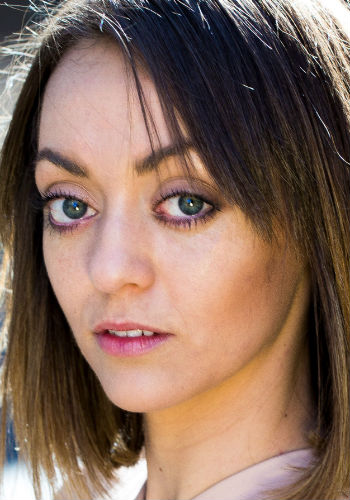
Alison Benstead
Katie Regan: How did you find rehearsing by yourself for so long?
Alison Benstead: It was definitely challenging, as Ignus’ purpose in the play is to help others. I was quite literally ‘waiting’ to meet everyone, so in that way, I think I was absolutely feeling the way Ignus would have.
What do you think Ignus did when she was living?
I have a theory. When I took on the character, there wasn’t a great deal of backstory that had already been decided, except that she died in the 1950s of some kind of internal haemorrhaging. I have been playing with the idea that she was a housewife, perhaps in a somewhat controlling marriage, and didn’t have a great deal of control over what her purpose was. I believe that she was a loving wife and wanted more than anything to be a mother, and that the haemorrhaging was caused by a miscarriage. There’s a lot of empathy and compassion in her, and I really get to play with the notion that she swings between being motherly towards the others, and seeing them all as a puzzle to solve.
How has your interpretation of the character changed over time?
It has changed a lot. I think I began rehearsals seeing her as this really magical archetype, and as we’ve developed her through rehearsal, I see far more human qualities. No character in this play is perfect; they’re all flawed in their own ways and that really is a gift for an actor to be able to explore.
All the characters experience time in the waiting room. How long do you think you would wait there until you searched for answers?
Not very long. I’m not a very patient person at the best of times, and my imagination would run wild with ideas and theories. The answers wouldn’t be as fun in the end.
Regret is heavily featured in the play. If Ignus had her time over again, how do you think she would have lived?
If she had her time over again, I think she would have lived a more empowered life. I see her being an Erin Brockovich kind of figure: fighting for what she believes in, and doing it with a big heart and a lot of grace.

Katie Regan
Alison Benstead: After reading the text, what was your first impression of Estelle, and what challenges did you anticipate when taking on this role?
Katie Regan: I found Estelle to be incredibly close to some of the people in my life. I think lots of people know an Estelle – she’s your friend, neighbour, co-worker. Outwardly she is relatively put together and follows the vein of most 20-somethings looking for fulfilment but, on the inside, she is entirely a drift with little to no real connection to the ‘real’ world. I knew it would be challenging to portray a character with very real and defined depression whilst also straddling the fine line of optimism she hides away inside herself.
How do you think you would personally react, waking up in the waiting room as Estelle did?
If I were to wake up in the waiting room like Estelle, I would immediately start looking for answers or an exit. I think my fight or flight would kick in very soon and, the first door I saw, I’d look for someone to talk to.
If Estelle had have carried on living, how do you think she would have lived her life?
I like to think that she became a visual artist or musician, channelling her experiences into something tangibly good for the world.
Why is this story important and relevant for audiences today, and what do you want your audiences to take away from this play?
I believe that this story is about the importance of choices: people can choose to be good or bad or apathetic but in actuality it’s the people we meet who change us. Because of the people Estelle meets in the waiting room, she is given another choice/chance at life. I want audiences to take away a sense of hope for the future and the choices that shape us.
In Waiting heavily features two strong female characters. Explain how their relationship and bond is instrumental to the story, and what they represent for each other.
Estelle and Ignus’ relationship represents the story coming full-circle, but it also shows the closing of a large chapter in both of their lives, or afterlives as it were. They are quite similar in that they both search for answers and are forces to be reckoned with. In terms of what they represent to each other, I think that they are both the final solution to each of their dilemmas. Nothing can move forward until they do together.
Alison Benstead and Katie Regan can be seen in In Waiting by Liviu Monsted.
Dates: 11 – 19 Oct, 2018
Venue: Blood Moon Theatre